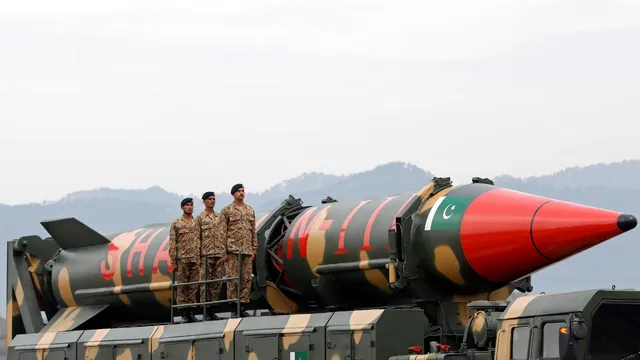- By Shivangi Sharma
- Wed, 25 Jun 2025 05:14 PM (IST)
- Source:JND
Pakistan is actively developing a long-range intercontinental ballistic missile (ICBM) capable of reaching the continental United States, according to a recent assessment by US intelligence agencies. The development, if confirmed, marks a significant escalation in Pakistan’s strategic capabilities and could reshape Washington’s view of Islamabad as a nuclear adversary.
An Intercontinental Ballistic Missile (ICBM) is a guided missile with a minimum range of 5,500 kilometres (approximately 3,400 miles). These missiles are designed primarily for delivering nuclear warheads and are capable of reaching targets across continents. While they could theoretically carry conventional, chemical, or biological payloads, such applications have never been used operationally.
Currently, only a handful of nations, including the US, Russia, China, and North Korea, possess operational ICBMs. If Pakistan successfully joins this group, it would significantly alter the balance of nuclear power globally.
Escalation Of Pakistan’s Missile Ambitions
Pakistan’s most advanced missile to date, the Shaheen-III, has a range of approximately 2,700 kilometres, sufficient to cover all of India. An ICBM would extend its reach to over 5,500 kilometres, bringing even US cities within potential striking range. US officials warn that such a development would force Washington to formally classify Pakistan as a nuclear adversary, a designation currently reserved for Russia, China, and North Korea.
Pakistan’s nuclear weapons program began in the early 1970s in response to India’s growing capabilities. The country declared itself a nuclear-armed state in 1998 after a series of tests, and today, it is estimated to possess around 170 nuclear warheads. Pakistan is not a signatory to the Nuclear Non-Proliferation Treaty (NPT) and has continued to develop its missile arsenal outside international regulatory oversight.
In 2023, the US imposed sanctions on Pakistan’s state-run missile development agency, the National Development Complex, and three associated firms. These sanctions include asset freezes and bans on American businesses engaging with the entities.
Washington has expressed growing concern over Pakistan’s expanding nuclear stockpile and its strategic partnership with China, which is also expanding its nuclear and missile programs. US intelligence officials argue that a Pakistani ICBM could have destabilising effects not just on South Asia but on global security.

